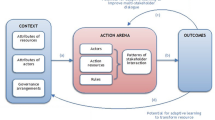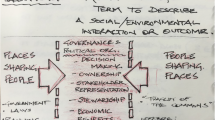Abstract
This paper deploys the concept of community governance in problematising the relationships between community-based organisations which generate participation in decision making at local or neighbourhood levels. I integrate Bourdieu’s “field theory” with the concept of “nodal governance”; conceptualising community governance as constituting a ‘field of local power politics’ in which community-based organisations enrol and contest each other. These organisations enrol and contest each other as they struggle for political legitimacy, control of knowledge and access to economic resources and power. It is against a backdrop characterised by the contestation–coalition oxymoron that I raise questions about the (anti-)democratic dynamics between and within participation-generating community-based organisations. This analysis is embedded in a case study of community politics in Yeoville, Johannesburg.
Similar content being viewed by others
Notes
WCRB stands for Ward Committee Resource Book and WLG stands for White Paper on Local Government.
It is because of the need to conceptualise the neighbourhood as a ‘socio-spatial entity’ and ‘political community’ that I chose to use the concept of ‘community governance’ to explore political relationships within and between participation-generating community organisations.
This paper is a product of my ongoing Ph.D. research partly funded by the Volkswagen Foundation and integrated into Yeoville Studio, which is an initiative of the School of Architecture and Planning, University of the Witwatersrand; where a number of joint research initiatives are being developed.
Hijacked houses are those houses that have been unlawfully occupied and are under the unlawful control of an individual or group without the consent or approval of the owner.
RDP houses are houses built under the National Housing Subsidies Scheme in South Africa, and are commonly named after the South African government’s Reconstruction and Development Plan (RDP).
These are buildings that have been neglected by owners. The problem of bad and abandoned buildings in Yeoville is compounded by the fact that several of them are classified by some members of the community as “hijacked buildings”.
YSF General Meeting, 19 August 2010
Zack et al. (2010: 9) define “bad buildings” as buildings which were once sound in physical structure, management, use and occupancy, but have become dysfunctional in one or more ways. Such buildings do not meet minimum requirements as stipulated in municipal by-laws and are a threat to the health and safety of occupants, neighbouring buildings and the environment (Zack et al. 2010: 9).
I wish to thank Dr. Claire Benit-Gbaffou for assistance in developing this point.
YBCEC is a pressure and advocacy created in November 2010. This advocacy group attempts to raise community awareness and lobby government agencies around community grievances pertaining to the commonly disdained but continuous granting of liquor licenses to liquor outlets, operation of illegal liquour outlets and rezoning of buildings among other challenges in Yeoville and Bellevue.
ANC stand for African National Congress; DA stands for Democratic Alliance and COPE stands for Congress of the People.
References
Bayart, J. (1993). The State in Africa: The politics of the belly. London: Longman.
Benit, C. (2002). The rise or fall of the ‘community’? Post-apartheid housing policy in Diepsloot, Johannesburg. Urban Forum, 13(2), 47–66.
Benit-Gbaffou, C. (2006). Police-community partnerships and responses to crime: Lessons from Yeoville and Observatory, Johannesburg. Urban Forum, 17(4), 301–326.
Benit-Gbaffou, C. (2010). Local democracy, clientelism and the (re)politicisation of urban governance—reflexions from Johannesburg stories. In Vishnu Padayachee, Chris Cramer, Bill Freund, Keith Hart, Nicolas Pons-Vignon (Eds.), The Political Economy of Africa, London: Routledge, pp. 286–300.
Benit-Gbaffou, C., & Mkwanazi, E. (2011). Constructing communities through invited spaces of participation—the management of xenophobic discourses in public meetings in Yeoville. Presentation to the CORUS seminar, 31 January–2 February 2011, Wits University, Johannesburg.
Bourdieu, P. (1977). Outline of a theory of practice. Cambridge: Cambridge University Press.
Bourdieu, P. (1985). Social space and the production of groups. Theory and Society, 14(6).
Bourdieu, P. (1990). The logic of practice. Cambridge: Polity Press.
Braithwaite, J. (1999). Accountability and governance under the New Regulatory State. Australian Journal of Public Administration, 58(1), 90–94.
Buccus, I., Hemson, D., Hicks, J., & Piper, L. (2007). Public participation and local governance: Research Report prepared by the Centre for Public Participation (CCP) in association with Human Sciences Research Council (HSRC) and the University of KwaZulu Natal (May 2007).
Burris, S. C., Drahos, P., & Shearing, C. D., (2005). Nodal governance. Australian Journal of Legal Philosophy, 30(2005). Available at SSRN: http://ssrn.com/abstract=760928.
Cohen, J., & Sabel, C. (1997). Directly-deliberative polyarchy. European Law Journal, 3(4), 313–342.
Cornwall, A. (2004). Spaces for transformation? Reflections on issues of power and difference in participation in development. In S. Hickey & G. Mohan (Eds.), Participation from tyranny to transformation: Exploring new approaches to participation in development (pp. 75–91). London: Zed Books.
Cornwall, A., & Gaventa, J. (2001). Bridging the gap: citizenship, participation and accountability. PLA Notes, 40, 32–35.
Crawford, A. (1999). The local governance of crime: appeals to community and partnerships. Oxford: Oxford University Press
Crawford, A. (2006). Networked governance and the post-regulatory state? Steering, rowing and anchoring the provision of policing and security. Theoretical Criminology, 10(2), 449–478.
Dryzek, J. (2002). Deliberative Democracy and Beyond: Liberals, Critics, Contestations. Oxford: Oxford University Press.
Duffy, K., & Hutchinson, J. (1997). Urban policy and the turn to community. The Town Planning Review, 68, 347–362.
Elwood, S. (2006). Beyond cooptation or resistance: Urban spatial politics, community organisations, and GIS-based spatial narratives. Annals of the Association of American Geographers, 96(2), 323–341.
Ferguson, J. (2006). Global shadows: Africa in the neoliberal world order. Durham: Duke University Press Books.
Gaventa, J. (2006a). Finding spaces for change. IDS Bulletin Number 6, November. Institute of Development studies.
Gaventa, J. (2006b). Triumph, deficit or contestation? Deepening the deepening democracy debate. IDS Working Paper in conjunction with LogoLink and the Citizenship DRC.
Habermas, J. (1979). Communication and the evolution of society. London: Heinemann.
Holliday, I. (2000). Is the British state hollowing out? The Political Quarterly, 71(2), 167–176.
Jenkins, R. (1992). Pierre Bourdieu: Key Sociologists. London: Routledge.
Kymlicka, W. (2001). Politics in the vernacular: Nationalism and citizenship. Oxford: Oxford University Press.
Lefebvre, H. (1991). The production of space. Translated by Donald Nicholson-Smith. Oxford: Blackwell Publishing.
Lemanski, C. (2008). Houses without community: problems of community (in) capacity in Cape Town, South Africa. Environment and Urbanization, 20(2), 393–410.
McEwan, C. (2005). New spaces of citizenship? Rethinking gendered participation and empowerment in South Africa. Political Geography, 24(8), 969–991.
Miraftab, F. (2004) Invited and invented spaces of participation: neoliberal citizenship and feminists’ expanded notion of politics. Wagadu, Volume 1, Spring 2004, pp. 1–7.
Miraftab, F., & Wills, S. (2005). Insurgency and space of active citizenship. The story of Western Cape Anti-eviction campaign in South Africa. Journal of Planning Education and Research, 25(2), 200–217.
Moyo, J. (1993) Civil society in Zimbabwe. Zambezia (1993), XX (i).
Nyamnjoh, F. B. (2006). Insiders and Outsiders: Citizenship and Xenophobia in Southern Africa. London: Zed Books.
Nyamnjoh, F. B. (2010). Racism, ethnicity and the media in Africa: reflections inspired by studies of xenophobia in Cameroun and South Africa. Africa Spectrum, 45(1), 57–93.
Pasotti, E. (2010). Political branding in cities: The decline of machine politics in Bogota, Naples and Chicago. Cambridge: Cambridge University press.
Pillora, S., & McKinlay, P. (2011). Local governance and community governance: a literature review: Working paper No.2: An Australian government initiative.
Piper, L., & Deacon, R. (2008a). Partisan ward committees and community participation: The Msundizi case. Critical Dialogue—Public Participation in Review. Durban, Centre for Public Participation.
Piper, L., & Deacon, R. (2008b). Party politics, elite accountability and public participations: ward committee politics in Msundizi Municipality. Transformation, 66(67), 76–96.
Rhodes, R. A. W. (1996). The new governance: governing without government1. Political Studies, 44(4), 652–667.
Shearing, C., & Wood, J. (2003). Nodal governance, democracy and the new denizens. Journal of Law and Society., 30(3), 400–419.
Sinwell, L. (2009). Participatory spaces and the Alexandra Vukunzele Crisis Committee (AVCC): reshaping government plans. Social Dynamics, 35(2), 436–449.
Stewart, J., & Clarke, M. (1996). Developments in Local Government (Discussion Paper), Institute of Local Government Studies. UK: University of Birmingham.
Swyngedouw, E. (2011). Interrogating post-democratization: reclaiming egalitarian political spaces. Political Geography, 30, 370–380.
Thembuland Royal Empire (2010). Thembus now have an Emperor. Retrieved from: http://mybroadband.co.za/vb/showthread.php/225211-Thembus-now-have-emperor. on January 22, 2011.
Totikidis, V., & Armstrong, A. F., et al. (2005). The concept of community governance: A preliminary review. Refereed paper presented at the Govnet Conference, Monash University, Melbourne 28th–30th November, 2005, Centre for International Corporate Governance Research, Faculty of Business and Law, Victoria University.
Vergunst, P. J. B. (2006). Community cohesion: constructing boundaries between or within communities-of-place. The Rural Citizen: Governance, Culture and Wellbeing in the 21st Century. University of Plymouth.
WCRB (Ward Committee Resource Book) (2005). Making ward committees function: Ward Committee resource book - Best practices and lessons learnt for municipal officials, councillors and local governance practitioners. Department: Provincial and Local government, Republic of South Africa (in partnership with GTZ), Idasa and Afesis-corplan. December 2005.
Weatherford, M. S. (1992). Measuring political legitimacy. The American Political Science Review, 86(1), 149–166.
Wood, J., & Dupont, B. (2006). Democracy, society and the governance of security. Canadian Journal of Sociology Online. Available at: http://www.cjsonline.ca/pdf/securitygov.pdf. October 2006.
Wood, J., & Shearing, C. (2006). Security and nodal governance. Prepared for seminar at the Temple University Beasley School of Law Philadelphia, 25 October.
WPLG, (1998). White Paper on Local Government. Government of South Africa, 9 March, 1998.
Yarwood, R. (2007). The geographies of policing. Progress in Human Geography, 31(4), 447–465.
YBCDT (Yeoville-Bellevue Development Trust) (2011). Back in the day. Retrieved from http://www.yeoville.org.za/yeoville-history.php, Retrieved on January 10, 2011.
Yeovue News (2011). “2011 local government elections in Yeoville Bellevue”. Yeovue News Vol 4, Number 14, page 2.
Zack, T., Bertoldi, A., Charlton, S., Kihato, M., & Silverman, M. (2010). Final Draft: Strategy for addressing bighted medium and high density residential “bad building” in Johannesburg. City of Johannesburg: Bad Buildings Strategy, Final Draft, 16 March 2010.
Author information
Authors and Affiliations
Corresponding author
Additional information
I wish to express my gratitude to Dr. Claire Benit-Gbaffou for the constructive criticism and mentorship that aided the refinement of this work. Many thanks also go to the rest of members of the Voices of the Poor in Urban Governance Research Network (CORUS) including Prof. Laurence Piper, Dr. Sophie Oldfield, Dr. Paula Meth, Dr. Luke Sinwell, Prof. Gervais-Lambony, Prof. Alan Mabin and the entire team for academic support. I also extend my deep gratitude to Urban Forum peer reviewers who did great work reviewing this work.
Rights and permissions
About this article
Cite this article
Katsaura, O. Community Governance in Urban South Africa: Spaces of Political Contestation and Coalition. Urban Forum 23, 319–342 (2012). https://doi.org/10.1007/s12132-011-9138-5
Published:
Issue Date:
DOI: https://doi.org/10.1007/s12132-011-9138-5




